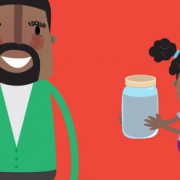Growing “patience candy”
This science-related activity is based on Colossians 1:10-12.
You will need one cup of water, three cups of sugar, a glass jar, a paper clip, food colouring (optional), a paper towel or coffee filter, and wool or cotton string.
- As the adult supervising, boil a cup of water on the stovetop.
- Remove the pot from the stove and have your children help you stir in the three cups of sugar, one teaspoon at a time. (This is the first patience exercise.) As your children stirs each teaspoon of sugar until it dissolves, talk about situations where it is hard to be patient. Encourage them to stir diligently. (If the sugar is not stirred in gradually, your “patience candy” will not form properly.) Once sugar starts to clump at the bottom of the pot, enough has been added.
- Next, pour your sugar-saturated solution into a clear glass jar. If you wish, now is the time to use food coloring to tint the sugar water.
- To create a growing surface for the crystals, tie a wool or cotton string to the middle of a pencil. Tie a paper clip or similar sterile, lead-free weight to the other end of the string.
- Dangle the string into the sugar solution, making sure the weight is very close to, but not touching the bottom of the jar.
- Move the jar to a location in your house where it will be undisturbed, but can be observed closely. Cover the top with a paper towel or coffee filter to protect it from contamination.
- All that is left to do is watch and wait. About 24 hours afterward, you should see crystals forming. Crystals will continue to form until the sugar is used up.
- Finally, remove the crystals and allow them to dry. You can save them or eat them.
As you enjoy eating or admiring the crystals, take time to discuss with your children that it is God’s power in us that helps us to be patient. Just as the crystals did not grow right away, sometimes it takes time for the Fruit of the Spirit to grow in us. Explain that being patient is hard, but with God’s help it is possible. Talk about how being patient pleases God. Finish by praying with your children, asking God to send His Holy Spirit to grow patience in the hearts of your family members.
Note: For an easier option, blogger Julie suggests making JELL-O® instead of sugar candy. Or for a sugar-free alternative, encourage your children to be patient as they grow a flowering plant and wait for it to bloom.
Relevant Scripture
Colossians 1:10-12 “And we pray this in order that you may live a life worthy of the Lord and may please Him in every way: bearing fruit in every good work, growing in the knowledge of God, being strengthened with all power according to His glorious might so that you may have great endurance and patience, and joyfully giving thanks to the Father who has qualified you to share in the inheritance of the saints in the kingdom of light.”







